Intake Manifold Replacement Lower
Removal Procedure
Caution: Unless directed otherwise, the ignition and start switch must be in the OFF or LOCK position, and all electrical loads must be OFF before servicing
any electrical component. Disconnect the negative battery cable to prevent an electrical spark should a tool or equipment come in contact with an exposed electrical terminal. Failure to follow these precautions may result in personal injury and/or damage to
the vehicle or its components.
- Disconnect the negative battery cable.
- Depressurize the fuel system. Refer to
Fuel Pressure Relief
in Engine Controls - 3.1L.
- Remove the top half of the air cleaner assembly.
- Drain and recover the cooling system. Refer to
Cooling System Draining and Filling
in Engine Cooling.
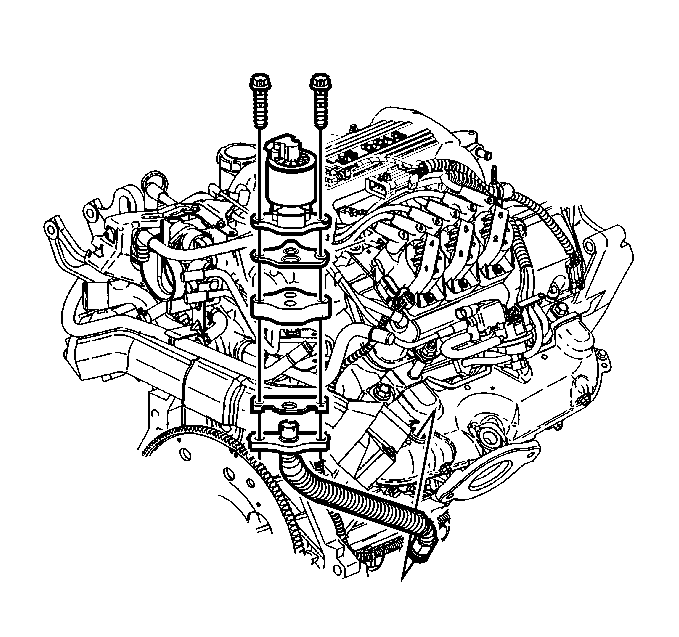
- Remove the EGR pipe from the exhaust manifold.
- Remove the drive belt. Refer to
Drive Belt Replacement
.
- Remove the brake vacuum pipe at the plenum.
- Remove the power steering lines at the generator bracket.
- Remove the generator. Refer to
Generator Replacement
in Engine Electrical.
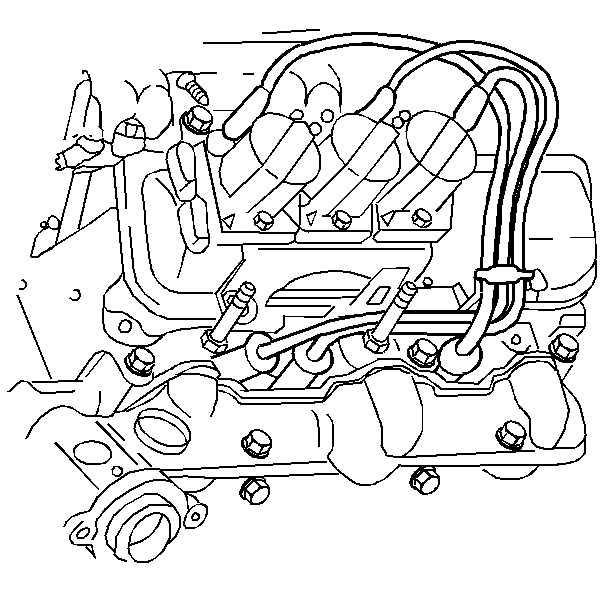
- Remove the secondary ignition wires from
the spark plugs.
- Remove the secondary ignition wires from the harness at the plenum.
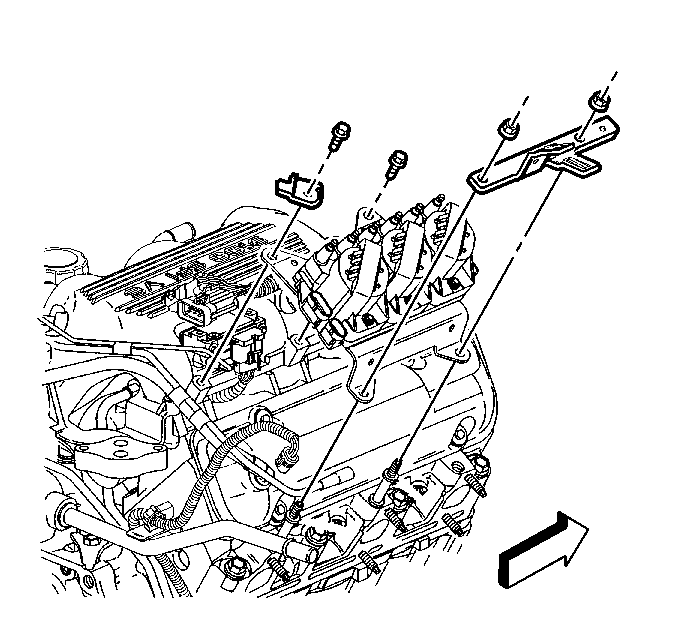
- Remove the following components at the same
time:
| • | Electronic ignition coil and module assembly |
| • | EVAP canister purge solenoid |
- Remove the following upper engine wiring connectors:
| • | Throttle Position (TP) sensor |
| • | Engine Coolant Temperature (ECT) sensor |
| • | Camshaft Position (CMP) sensor |
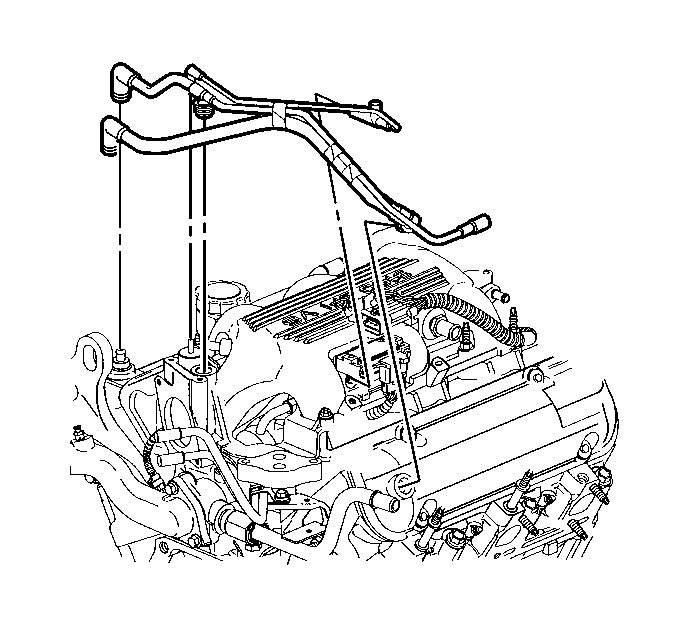
- Remove the following vacuum lines:
| • | Fuel Pressure Regulator |
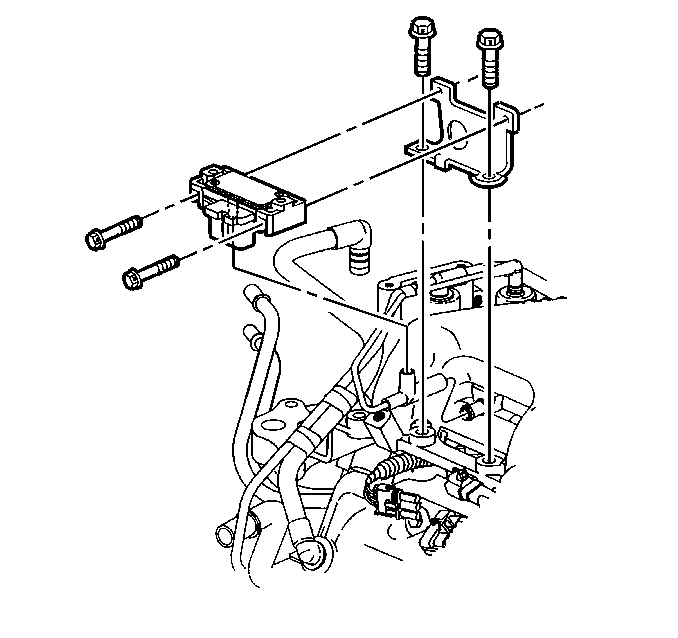
- Remove the MAP sensor from the upper intake
manifold.
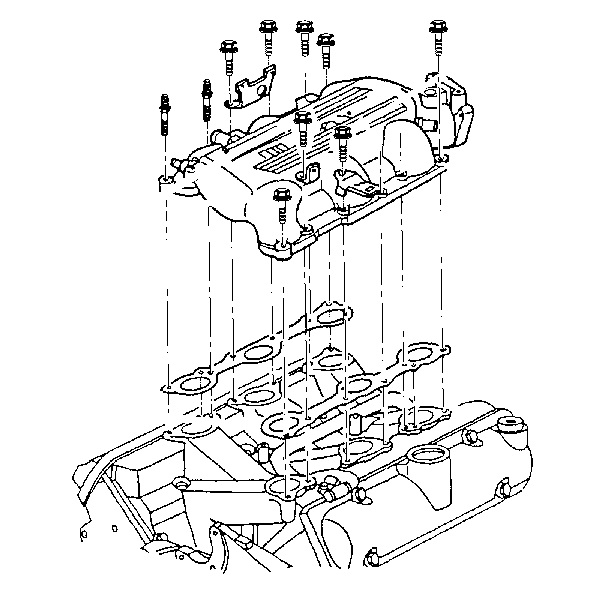
- Remove the upper intake manifold bolts.
- Remove the upper intake manifold.
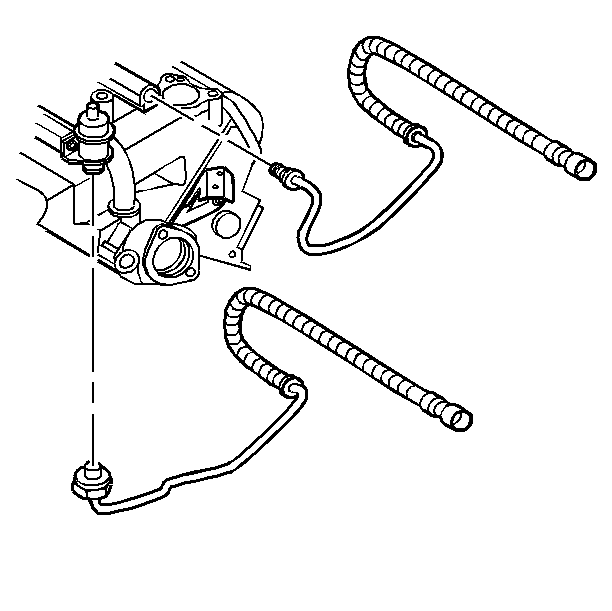
- Remove the fuel lines at the fuel rail
and the bracket.
- Install the J 28467-360
.
- Remove the engine mount assembly. Refer to
Engine Mount Replacement
.
- Remove the power steering mounting bolts. Support the pump aside. Refer
to
Power Steering Pump Replacement
in Pwer
Steering System.
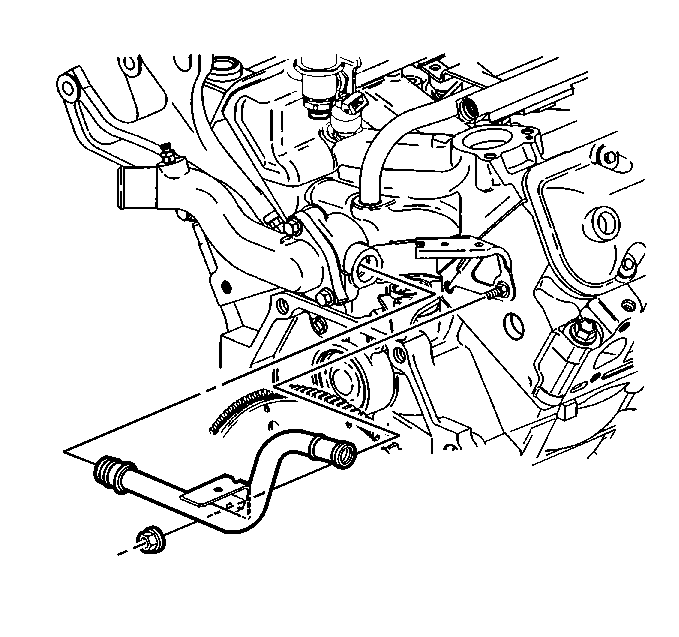
- Remove the heater inlet pipe from the coolant
outlet housing.
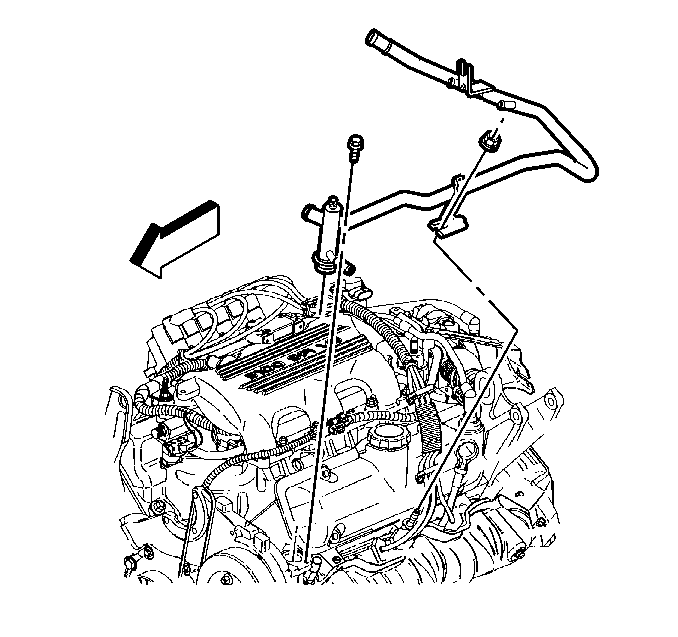
- Remove the heater by-pass at the coolant
pump and the cylinder head.
- Remove the radiator hose at the heater outlet housing.
- Remove the heater outlet housing.
- Remove both of the valve rocker covers. Refer to
Valve Rocker Arm Cover Replacement
.
Important: Retain the washers in the same orientation on the center bolts.
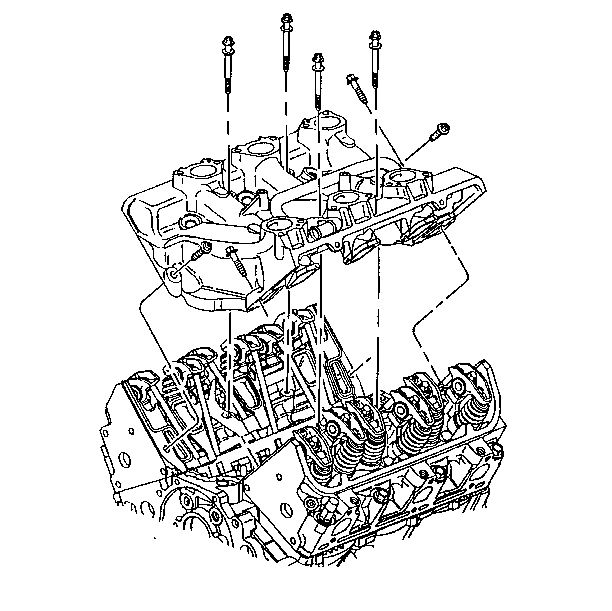
- Remove
the lower intake manifold bolts.
- Remove the lower intake manifold.
- Loosen the rocker arms.
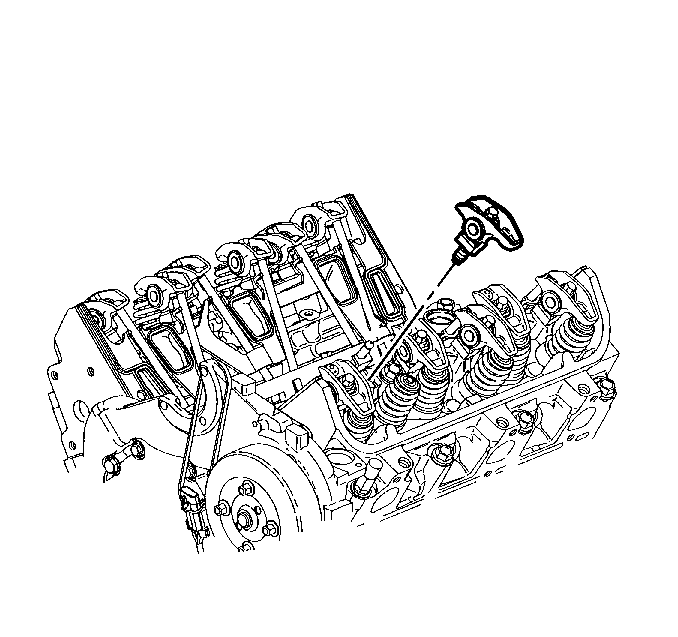
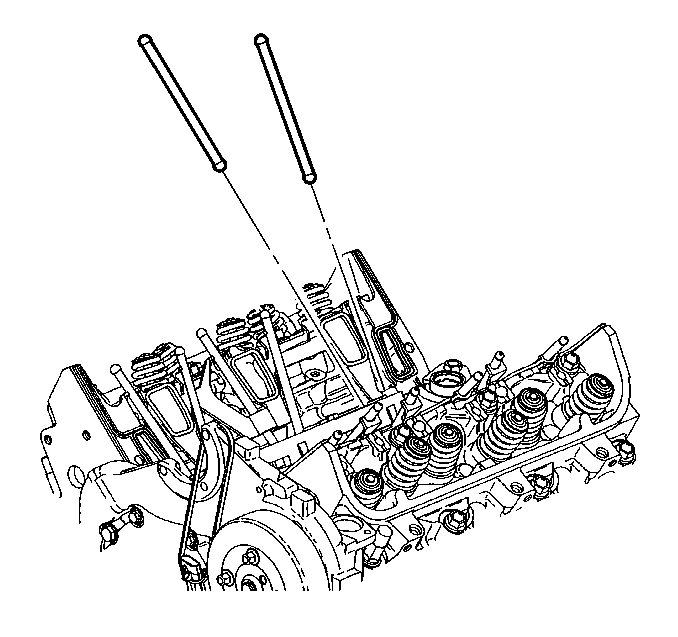
Important: Keep the pushrods in order. The pushrods must be installed in the original
position.
- Remove the pushrods.
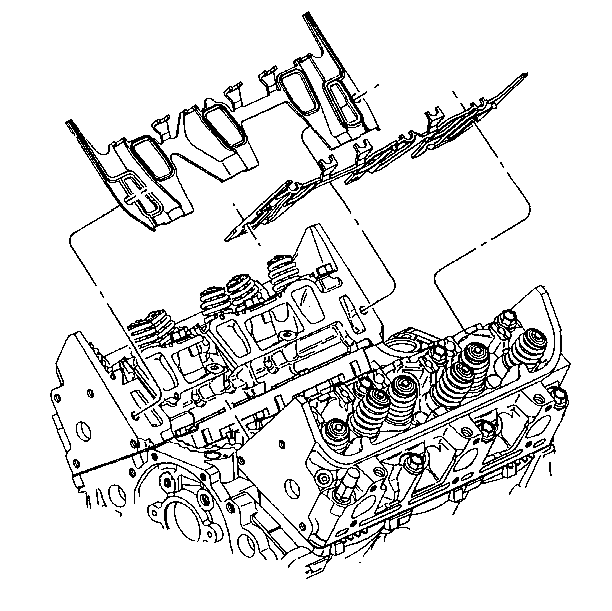
- Remove the intake gasket.
- Inspect the flatness of the inlet flanges.
- Clean the following items:
| • | Gasket material from the mating surfaces |
| • | Excess RTV sealant from the front and the rear ridges of the cylinder |
| • | Sealing surfaces with degreaser |
Installation Procedure
Important: All gasket-mating surfaces need to be free of oil, and foreign material. Use
GM P/N 12346139 (Canadian P/N 10953463) or equivalent
to clean surfaces.

- Install the intake manifold gasket.

- Install the pushrods.
| 2.1. | Install the pushrods in their original location. |
| 2.2. | Coat the ends of the pushrods with prelube GM P/N 1052356,
or the equivalent. |
| 2.3. | Intake pushrods are 144 mm (5.75 in). |
| 2.4. | Exhaust pushrods are 152.5 mm (6.0 in). |
| 2.5. | Ensure that the pushrods seat in the lifter. |
Notice: Use the correct fastener in the correct location. Replacement fasteners
must be the correct part number for that application. Fasteners requiring
replacement or fasteners requiring the use of thread locking compound or sealant
are identified in the service procedure. Do not use paints, lubricants, or
corrosion inhibitors on fasteners or fastener joint surfaces unless specified.
These coatings affect fastener torque and joint clamping force and may damage
the fastener. Use the correct tightening sequence and specifications when
installing fasteners in order to avoid damage to parts and systems.
- Install the rocker arm bolts.
Tighten
Tighten the bolts to 10 N·m (89 lb in) +30 degrees.
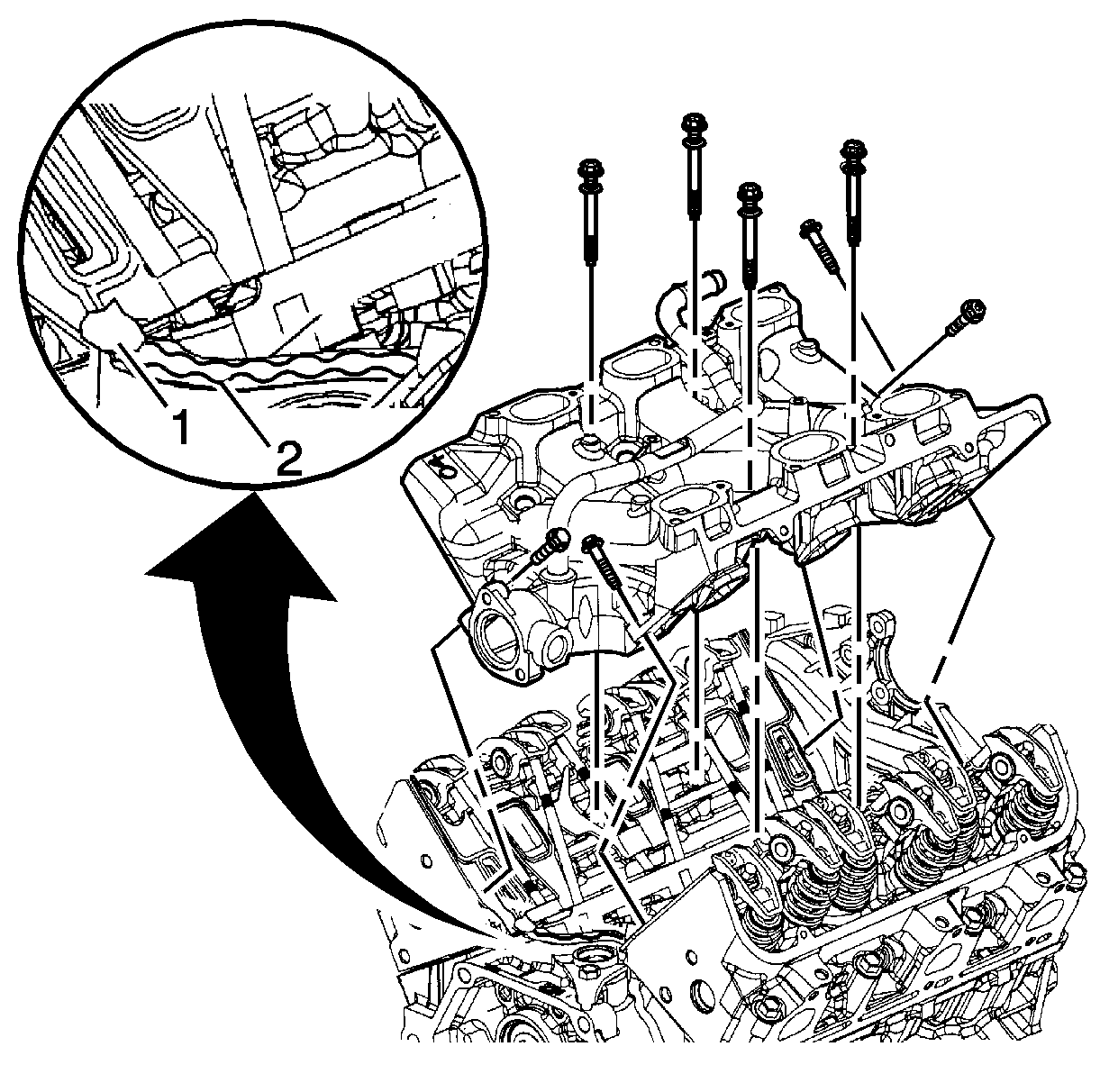
Important: All gasket-mating surfaces need to be free of oil, and foreign material. Use
GM P/N 12346139 (Canadian P/N 10953463) or equivalent
to clean surfaces.
- With gaskets in place apply a small drop 8-10 mm (0.31-0.39 in)
of RTV sealer GM P/N 12346141 (Canadian P/N 10953433)
or equivalent to the 4 corners of the intake manifold to block joint (1).
- Connect the 2 small drops with a bead of RTV sealer that is between
8-10 mm (0.31-0.39 in) wide and 3.0-5.0 mm (0.12-0.20 in)
thick (2).
- Install the lower intake manifold.
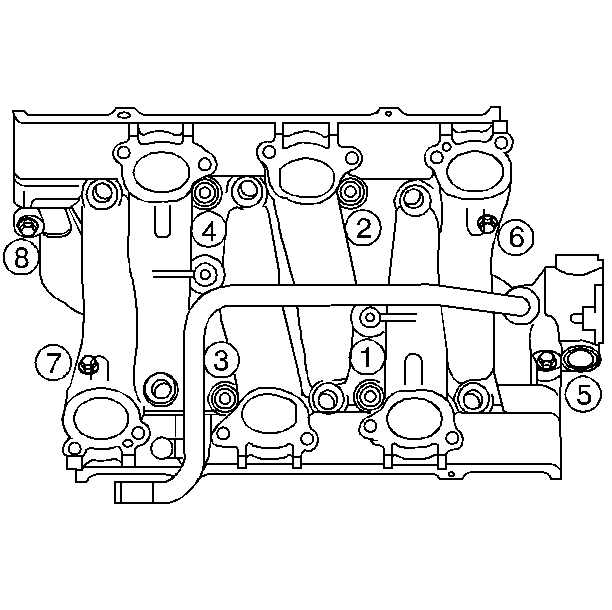
Important: All lower intake manifold bolts need to be cleaned, free of any foreign material,
and reused only if new bolts are unavailable. Use GM P/N 12345382 (Canadian P/N 10953489)
or equivalent and apply to the old intake manifold bolt threads.
Important: Manufacturer recommends the center bolts be fully torqued before the diagonal
bolts to assure proper seal ability.
Important: Lower intake manifold bolts in location 6 and 7 should be torqued to specification
using a crows foot type tool.
- Install the lower intake manifold bolts.
Tighten
- Tighten the lower intake manifold bolts in sequence to 7 N·m
(62 lb in) on the first pass.
- Tighten the lower intake manifold bolts (1, 2, 3, 4) in sequence
to 13 N·m (115 lb in) on the final pass.
- Tighten the lower intake manifold bolts (5, 6, 7, 8) in sequence
to 25 N·m (18 lb ft) on the final pass.
- Install the water outlet housing.
- Install the radiator hose to the thermostat housing.

- Install the heater inlet pipe to the thermostat
housing.
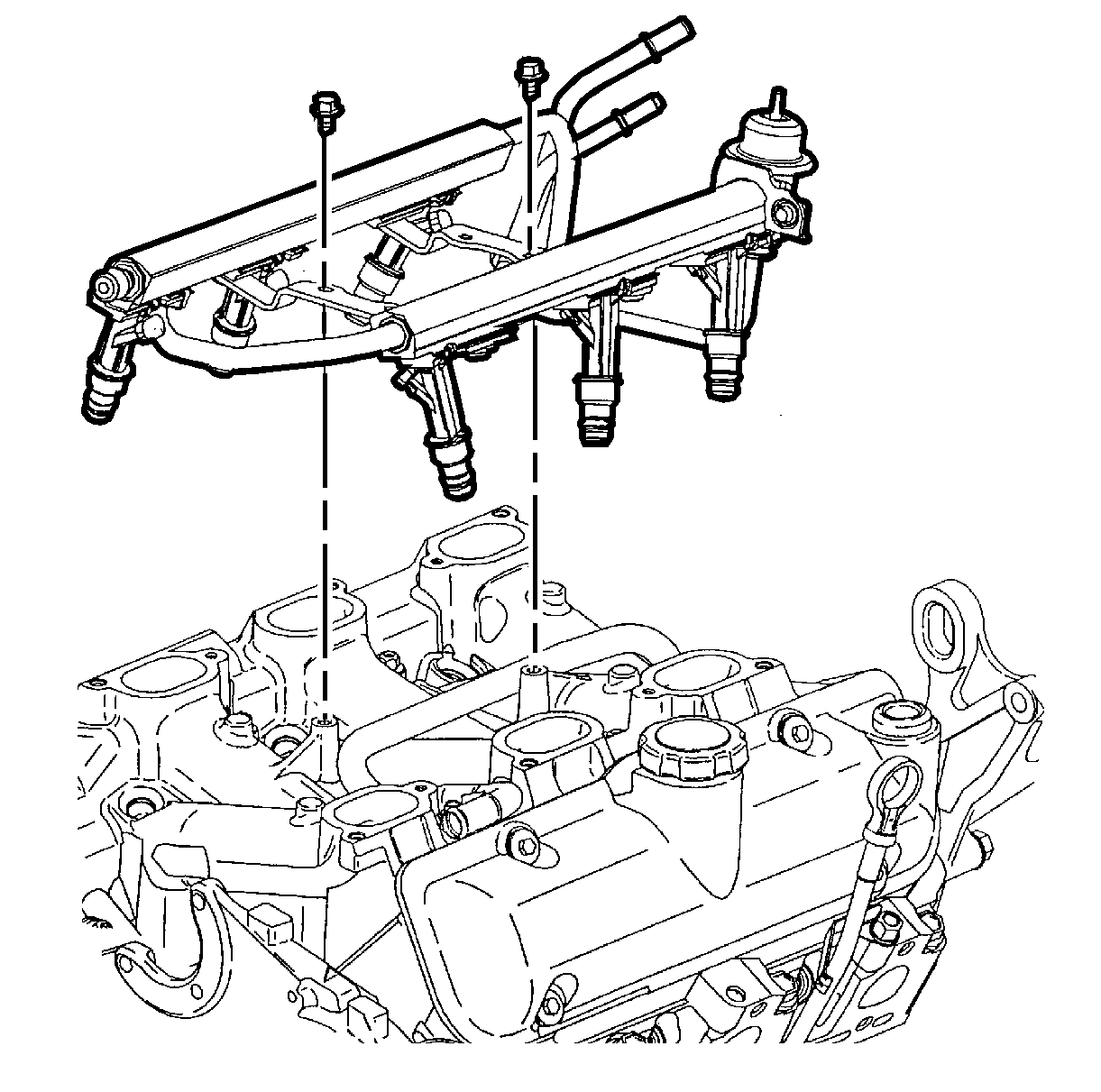
Important: Do not press on the fuel pressure regulator valve when installing the fuel injector
rail assembly.
- Install the fuel injector rail assembly.
| 11.1. | Install the fuel injector O-rings using GM P/N 12345616,
(Canadian P/N 993182) or equivalent. |
| 11.2. | Install the injector nozzles into the lower intake manifold injector bores. |
| 11.3. | Press on the injector rail using the palms of both hands until the injectors
are fully seated. |
- Install the fuel injector rail bolts.
Tighten
Tighten the fuel injector rail bolts to 10 N·m (89 lb in).
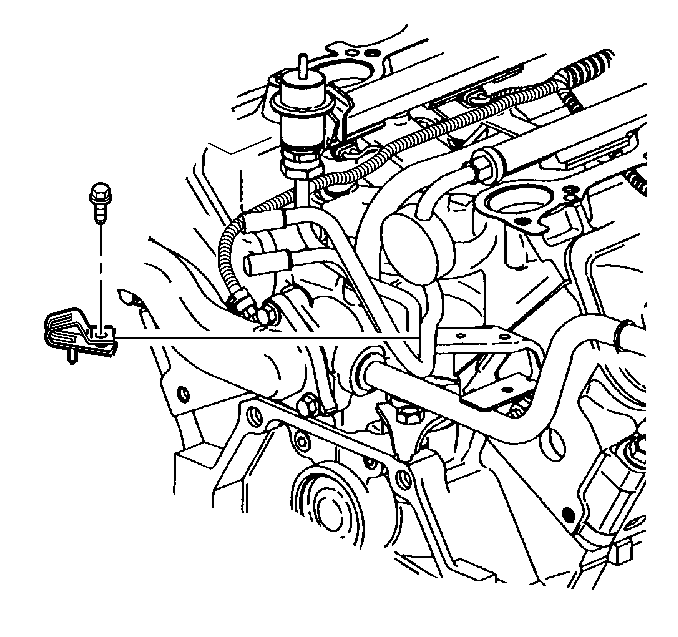
- Install the fuel feed and return pipe retaining
clip.
- Install the fuel feed and return pipe retaining clip bolt.
Tighten
Tighten the fuel feed and return pipe retaining clip bolt to 8 N·m
(71 lb in).

- Install the upper intake manifold. Refer
to
Intake Manifold Replacement
.
- Install the valve rocker covers. Refer to
Valve Rocker Arm Cover Replacement
.
Intake Manifold Replacement Upper
Removal Procedure
Tools Required
J 28467-360 Engine
Support Fixture.
Caution: Unless directed otherwise, the ignition and start switch must be in the OFF or LOCK position, and all electrical loads must be OFF before servicing
any electrical component. Disconnect the negative battery cable to prevent an electrical spark should a tool or equipment come in contact with an exposed electrical terminal. Failure to follow these precautions may result in personal injury and/or damage to
the vehicle or its components.
- Disconnect
the negative battery cable.
- Depressurize the fuel system. Refer to
Fuel Pressure Relief
in Engine Controls - 3.1L.
- Remove the top half of the air cleaner assembly.
- Drain and recover the cooling system. Refer to
Cooling System Draining and Filling
in Engine Cooling.
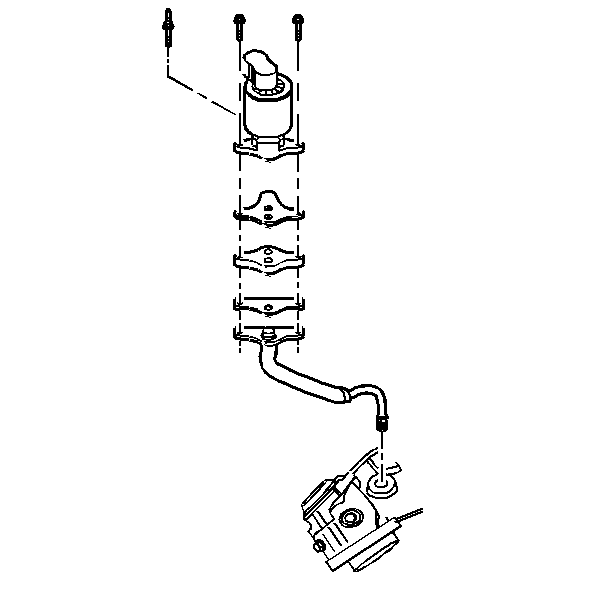
- Remove the EGR pipe from
the exhaust manifold.
- Remove the drive belt. Refer to
Drive Belt Replacement
.
- Remove the brake vacuum pipe at the plenum.
- Remove the power steering lines at the generator bracket.
- Remove the generator. Refer to
Generator Replacement
.

- Remove the secondary ignition
wires from the spark plugs.
- Remove the secondary ignition wires from the harness at the plenum.
- Remove the following components at the same time:
| • | Electronic ignition coil and module assembly |
| • | EVAP canister purge solenoid |
- Remove the following upper engine wiring connectors:
| • | Throttle Position (TP) sensor |
| • | Engine Coolant Temperature (ECT) sensor |
| • | Camshaft Position (CMP) sensor |
- Remove the following vacuum lines:
| • | Fuel Pressure Regulator |
- Remove the MAP sensor from the upper intake manifold.

- Remove the upper intake
manifold bolts.
- Remove the upper intake manifold.
Installation Procedure

- Install the upper intake
manifold.
Notice: Use the correct fastener in the correct location. Replacement fasteners
must be the correct part number for that application. Fasteners requiring
replacement or fasteners requiring the use of thread locking compound or sealant
are identified in the service procedure. Do not use paints, lubricants, or
corrosion inhibitors on fasteners or fastener joint surfaces unless specified.
These coatings affect fastener torque and joint clamping force and may damage
the fastener. Use the correct tightening sequence and specifications when
installing fasteners in order to avoid damage to parts and systems.
- Install the upper
intake manifold bolts.
Tighten
Tighten the bolts to 25 N·m (18 lb ft).
- Install the MAP sensor.
- Connect the following vacuum lines:
| • | Fuel Pressure Regulator |
- Install the following upper engine wiring connectors:
| • | Throttle Position (TP) sensor |
| • | Engine Coolant Temperature (ECT) sensor |
| • | Camshaft Position (CMP) sensor |
- Install the following components:
| • | EVAP canister purge solenoid |
| • | Electronic ignition coil and module assembly |
- Install the generator. Refer to
Generator Replacement
in Engine Electrical.
- Install the power steering line at the generator bracket.
- Install the drive belt. Refer to
Drive Belt Replacement
.

- Install the secondary
ignition wires to the spark plugs.
- Install the secondary ignition wires to the harness at the plenum.

- Install the EGR pipe to
the exhaust manifold.
- Install the following items to the throttle body:
- Install the top half of the air cleaner assembly.
- Install the brake vacuum pipe.
- Install the cables to the throttle body.
- Fill the cooling system. Refer to
Cooling System Draining and Filling
in Engine Cooling.
- Connect the negative battery cable.
- Inspect for proper fluid levels.
- Check for leaks.



























